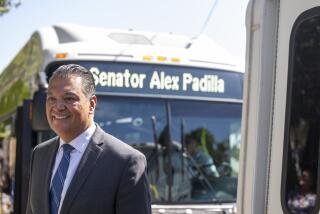Not Even God Gives Cars Entering Street Right of Way
- Share via
Dear Street Smart:
One morning, I and several other motorists were stopped on a public street by representatives of a church.
We had to wait until all the parishioners’ cars exited the facility.
Is this blocking of a public street legal? Didn’t I have the right of way? This was a normal church service--not a funeral.
Shouldn’t people entering streets from private property stop, look and proceed when it’s safe?
Gene Phelps
Mission Viejo
You are right on all counts. “Vehicles entering a street from a private driveway have the responsibility of making sure that the pathway is clear before they do so,” said Steve Kohler, a spokesman for the California Highway Patrol. “This would apply to any private driveway, regardless of creed.”
The only exceptions, said Ted Boyne, traffic supervisor for the Orange County Sheriff’s Department, which covers Mission Viejo, are major public events for which organizers have obtained special permits.
“Another way of putting it,” Kohler said, “is that the cars already on the roadway have the right of way.”
Dear Street Smart:
While most people would readily agree that it’s against the law to throw burning trash out the window of a moving vehicle, it’s been my observation that too many smokers seem oblivious that they’re guilty of just that when they flick their cigarette butts out their car windows.
Can anything be done to educate the public (pedestrians are just as guilty) of the dangers and litter associated with treating our streets like their own personal ashtrays? How about a few public service billboards? Or maybe an urban version of Smokey Bear? Better yet, hefty fines would surely offset the county’s costs in cleaning up litter and extinguishing roadside fires.
Is this something our county and/or law enforcement agencies have the resources or interest to pursue?
Kathleen Gould
Tustin
The county certainly has the interest but has limited funds to mount a concerted educational campaign aimed at discouraging drivers from throwing their cigarettes out of their windows. Which is too bad, said Scott Brown, a spokesman for the Orange County Fire Authority, because that kind of action can start a fire.
The Fire Authority does, however, include information on the hazards of incendiary littering as part of the fire safety education presentation it gives at schools, businesses and civic organizations.
One bit of information imparted is that it is against the law to litter any road or highway with a lighted or unlighted cigarette, cigar, match or any other burning object. The penalty is a mandatory fine of $100 to $1,000 for the first offense; $500 to $1,000 for the second offense; and $750 to $1,000 for each offense thereafter. If convicted, a person also can be required to perform community service such as assisting in road cleanup.
In addition to employing four full-time educators and utilizing the part-time efforts of its 1,359 paid and volunteer firefighters, Brown said, the Fire Authority spends about $70,000 a year on its educational efforts. Because of your letter, Brown said, the department will look into whether cigarette butts should be given more emphasis.
Dear Street Smart:
I have noticed that some of the older freeways have grooves in them. All of the recent construction (at least in the last five years) has been creating smooth pavement for freeways. During heavy rains, I noticed that visibility is much worse on the smooth freeways than it is on the grooved ones. Has this ever been studied by Caltrans to determine which surface is the best? I can see a tremendous increase in accidents and closures with the coming heavy rains.
Oleg Chaikovsky
Irvine
Caltrans has never studied the issue. It has, however, determined that both surfaces create maximum friction between the tire and pavement, the glue that keeps your car on the road.
New concrete freeways normally are built without the grooves, said Maureena Duran-Rojas, an agency spokeswoman. Instead, they have smooth surfaces textured to maintain friction. In 10 to 20 years, though, the texture wears off and the road becomes slick. That’s when Caltrans workers reestablish the friction by grooving the pavement, providing a safe road without the expense of rebuilding it.
Duran-Rojas said the agency will study whether, as you suggest, the different surfaces have an effect on visibility during heavy rains.
Department of Motor Vehicles spokesman William Madison gave incomplete information in response to a question in last week’s Street Smart regarding an Orange County resident’s plan to buy a new car in another state and drive it home.
If you buy a new car out of state, Madison says, it can’t be registered in California unless it meets the state’s emission standards. In other words, it must carry a sticker certifying it for use in California. To assure that it does, you should contact the dealer in advance of the purchase.
If the car has more than 7,500 miles on it at the time of purchase, on the other hand, it can be registered in California whether or not it meets state standards, provided that the owner pays a $300 smog impact fee.
Street Smart appears Mondays in The Times Orange County Edition. Readers are invited to submit comments and questions about traffic, commuting and what makes it difficult to get around in Orange County. Include simple sketches if helpful. Letters may be published in upcoming columns. Please write to David Haldane, c/o Street Smart, The Times Orange County Edition, P.O. Box 2008, Costa Mesa, CA 92626, send faxes to (714) 966-7711 or e-mail him at David.Haldane@latimes.com. Include your full name, address and day and evening phone numbers. Letters may be edited, and no anonymous letters will be accepted.
More to Read
Sign up for Essential California
The most important California stories and recommendations in your inbox every morning.
You may occasionally receive promotional content from the Los Angeles Times.













